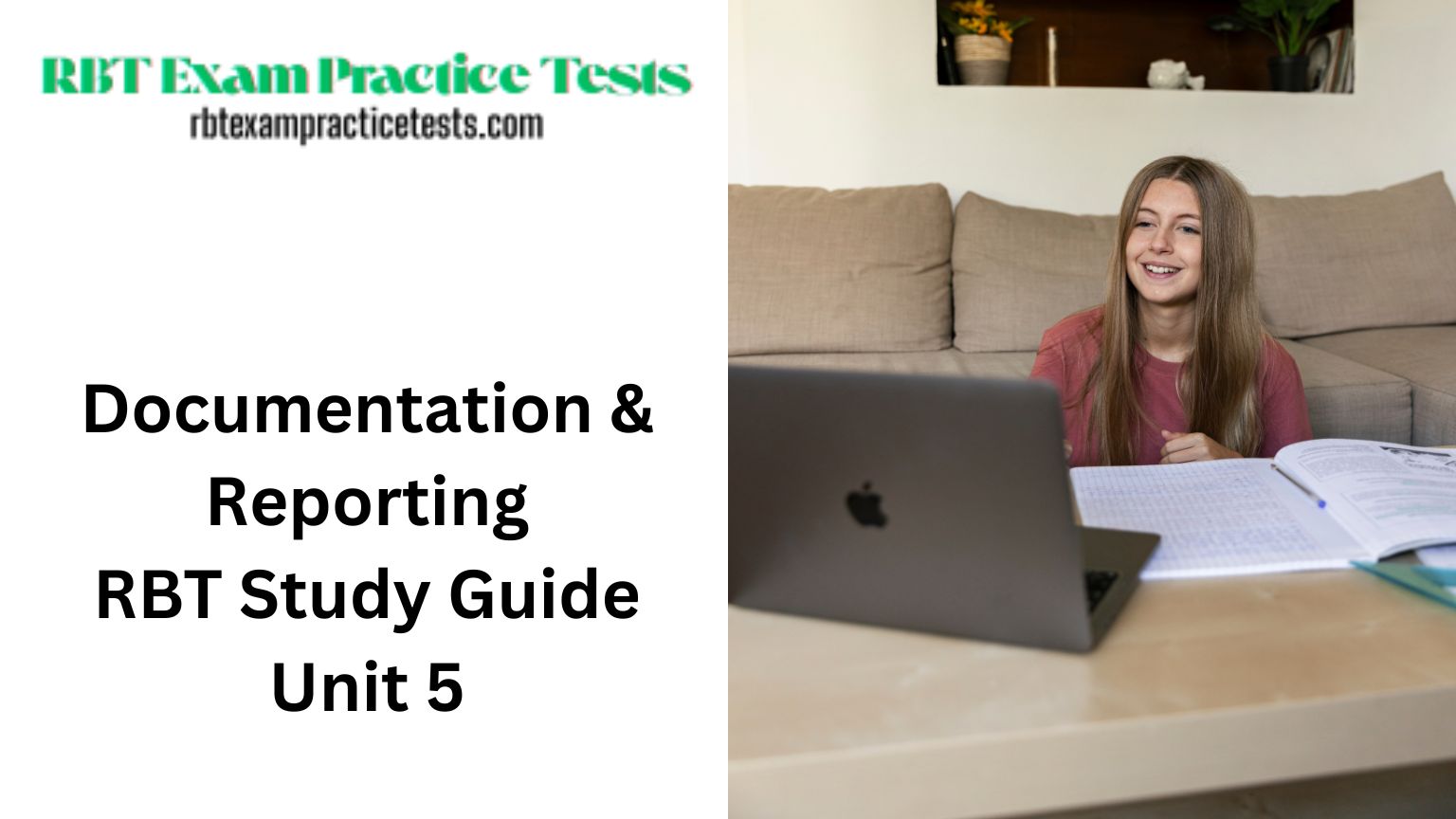Documentation and Reporting: RBT Study Guide Unit 5
Master essential skills for the RBT exam with our comprehensive guide on documentation and reporting. Prepare effectively with expert tips and free practice quizzes.
Why Documentation and Reporting Matter in ABA
Documentation and reporting are the backbone of Applied Behavior Analysis (ABA). As a Registered Behavior Technician (RBT), your ability to accurately document client sessions and report to your supervisor ensures effective therapy, tracks progress, and maintains compliance with legal and ethical standards. This guide, aligned with Section E of the RBT Task List (2nd Edition), covers critical tasks to help you excel in the RBT exam and your professional role. Expect 10 questions (13% of the exam) on this topic, making it a key area to master for certification.
Effective documentation drives data-driven decisions, ensuring consistency in treatment plans. By mastering these skills, you contribute to better therapy outcomes and professional accountability. Let’s explore the core components of documentation and reporting for RBTs.
Effective Communication with Supervisors
Ongoing communication with your Board Certified Behavior Analyst (BCBA) or Board Certified Assistant Behavior Analyst (BCaBA) is vital. The Behavior Analyst Certification Board (BACB) requires RBTs to receive supervision for at least 5% of their direct hours. For example, if you work 20 hours weekly, you need at least 1 hour of supervision monthly. This time is used to discuss client progress, challenges, and new behaviors.
Always approach communication professionally. If instructions are unclear, politely request clarification or a demonstration. For instance, you might say, “Could you demonstrate how to implement this new goal?” Timely reporting is critical, especially for urgent issues like new challenging behaviors or suspected abuse, which must be reported immediately to your supervisor and authorities, as RBTs are mandated reporters.
Reporting Critical Variables
RBTs must report variables that impact client progress promptly. These include:
- New or harmful behaviors during sessions
- Health changes, such as illness or sleep issues
- Household changes, like family transitions or moves
- Medication changes or new therapies
- External disruptions, such as sibling interference
For urgent issues, like illness affecting a session, notify your BCBA immediately. For less urgent changes, such as starting occupational therapy, discuss during your next supervision session. Always document these variables in session notes for accuracy and continuity.
Writing Objective Session Notes
Session notes are a critical part of a client’s medical history, read by supervisors, team members, caregivers, and sometimes insurance providers. Notes must be objective, measurable, and professional, completed within 24-48 hours per most organizational policies. Include only observable data, such as “Client completed 8/10 trials independently” instead of subjective statements like “Client seemed tired.”
Key elements of session notes include:
- Date, time, and duration of the session
- Client behaviors and progress on goals
- Interventions used and their outcomes
- Any incidents or variables affecting the session
Avoid mentalistic language unless directly quoted by the client. For example, instead of “Client was unmotivated,” write, “Client refused 3/5 tasks, stating, ‘I don’t want to work today.'”
Data Privacy and Legal Compliance
RBTs must adhere to strict data privacy regulations, such as the Health Insurance Portability and Accountability Act (HIPAA) in the U.S. This ensures client information remains confidential and secure. Follow workplace protocols for collecting, storing, and transporting data, such as using secure electronic systems or locked physical files. Never share client details without consent, and ensure all documentation complies with legal and ethical standards outlined in the BACB RBT Ethics Code.
Practice with Our RBT Quizzes
Test your knowledge and boost your confidence with our free, scenario-based quizzes tailored to documentation and reporting. These quizzes mirror the RBT exam format and help you identify areas for improvement. Start practicing now:
Test foundational concepts in documentation and reporting.
Explore advanced scenarios and supervisor communication.
Focus on data privacy and ethical reporting practices.
Master session note writing and variable reporting.
Tips for Success on the RBT Exam
To excel in the documentation and reporting section of the RBT exam, follow these strategies:
- Study the RBT Task List (2nd Edition) thoroughly, focusing on Section E.
- Practice writing objective session notes during your 40-hour training.
- Use scenario-based practice questions to apply concepts to real-world situations.
- Review the BACB RBT Ethics Code for ethical reporting guidelines.
- Simulate exam conditions with timed practice quizzes to build confidence.
By integrating these tips into your study plan, you’ll be well-prepared to tackle the 10 documentation and reporting questions on the RBT exam, which is administered at Pearson VUE testing centers and consists of 85 multiple-choice questions (75 scored) in 90 minutes.
Start Your RBT Journey Today
Mastering documentation and reporting is essential for your success as an RBT and for delivering high-quality ABA therapy. Use this guide, along with our free quizzes, to prepare effectively for the RBT exam. With consistent study and practice, you’ll be ready to pass the exam on your first attempt and begin a rewarding career as a Registered Behavior Technician. Visit rbtexampracticetests.com for more resources and start your journey today!
